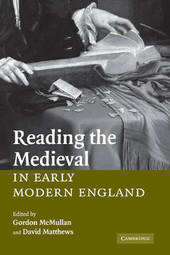
|
Reading the Medieval in Early Modern England
Hardback
Main Details
| Title |
Reading the Medieval in Early Modern England
|
| Authors and Contributors |
Edited by Gordon McMullan
|
|
Edited by David Matthews
|
| Physical Properties |
| Format:Hardback | | Pages:302 | | Dimensions(mm): Height 229,Width 152 |
|
| Category/Genre | Literary studies - general |
|---|
| ISBN/Barcode |
9780521868433
|
| Classifications | Dewey:820.9003 |
|---|
| Audience | | Professional & Vocational | |
|---|
| Illustrations |
13 Halftones, unspecified
|
|
Publishing Details |
| Publisher |
Cambridge University Press
|
| Imprint |
Cambridge University Press
|
| Publication Date |
30 July 2007 |
| Publication Country |
United Kingdom
|
Description
In English literary and historical studies the border between the Middle Ages and the Early Modern period, and hence between 'medieval' and 'early modern' studies, has become increasingly permeable. Written by an international group of medievalists and early modernists, the essays in this volume examine the ways in which medieval culture was read and reconstructed by writers, editors and scholars in early modern England. It also addresses the reciprocal process: the way in which early modern England, while apparently suppressing the medieval past, was in fact shaped and constructed by it, albeit in ways that early modern thinkers had an interest in suppressing. The book deals with this process as it is played out not only in literature but also in visual culture - for example in mapping - and in material culture - as in the physical destruction of the medieval past in the early modern English landscape.
Author Biography
Gordon McMullan is Reader in English at King's College London. David Matthews is Lecturer in Middle English Literature and Culture, School of Arts, Histories and Cultures at the University of Manchester.
Reviews"The last few years have witnessed a growing interest, largely on the part of medievalists, in examining the divide between the medieval and early modern periods.1 The essay collection reviewed here does an excellent job of showing how rich and complex these cross-period investigations can be- when the medieval period is not merely a backdrop to the early modern period but, rather, when these two periods are set in conversation." -Katherine Little, Fordham University "The fruits of a cross-period approach are quite apparent in the number of essays that demonstrate how medieval ways of thinking continued to haunt early modern writers, shaping their perception of what is new in their own period." -Katherine Little, Fordham University "These essays ultimately read the divide between medieval and early modern as an immensely generative struggle rather than a rejection or clean break." -Katherine Little, Fordham University "Scanlon, Simpson, and the essays in the first group discussed above are all clearly attuned to recent debates, whereas the essays by Matthews and Trigg, among others in the second and third groups described here, seem to adhere to an older version of ''medievalism,'' in which the focus is less on an interchange of modes of thinking than the early modern period's use of the medieval for its own ends. Nevertheless, the essays here offer much material for reflection and chart some new lines of inquiry." -Katherine Little, Fordham University
|